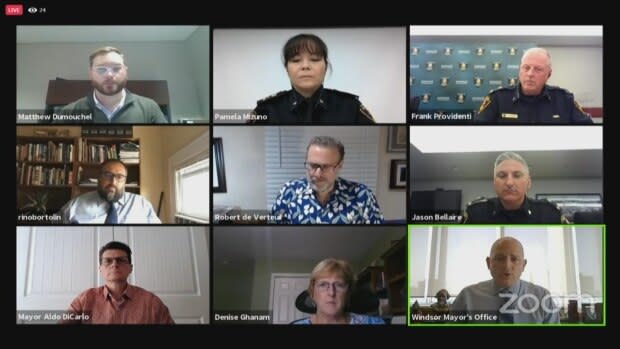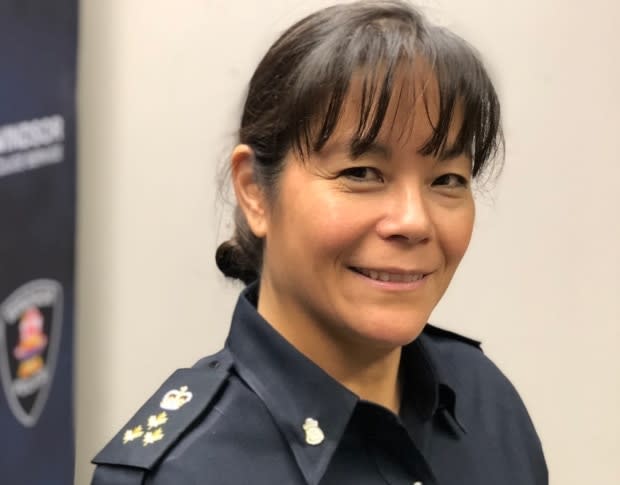Domestic-related incidents, violent crime uptick discussed during Windsor police board meeting
The Windsor Police Services Board held a virtual public meeting Thursday afternoon during which they discussed crime statistics in the region, how they're moving forward with the recommendations outlined in the Ontario Civilian Police Commission report from last month and addressed an employee having "inappropriately" accessed the province's COVID-19 database to search their own name.
A key takeaway from the meeting was the rise in violent crime and domestic incidents.
Between April and July, domestic-related occurrences increased from 300 to more than 400, dropping down to 361 in August.
There were 79 domestic assaults in July, up 31 from July 2019. In August, there was a total of 66 reported, an increase of 11 from August 2019.

Windsor Police Service (WPS) board member Denise Ghanam asked why this might be the case and if the pandemic has played a role.
"I'd be speculating a little, but I do think that's a very good connection. I think there'd be a correlation there," WPS deputy chief of operations Jason Bellaire said.
"You know, we never like to see any crime stat go up, but we certainly do not like to see any sort of the violent crime category statistics go up. But I do think that perhaps ... the current pandemic scenario may play into that."
Overall, August's crime rate was down compared to last year, but was up from July.
Notable August crime statistics from the report are:
275 incidents of violent crime — an increase of 50 from August 2019
105 non-family assaults — an increase of 26 from August 2019
882 property crimes — a decrease of 481 from August 2019
WPS board member Rino Bortolin requested that police also provide statistics on the number of non-service related calls they receive, particularly those related to mental health, addictions and homelessness.
"When we get the crime statistics, we can track month by month, we can see increases, decreases. We can see patterns. We don't get to see that for the non-crime related issues or statistics," Bortolin pointed out.
He said having this information might allow them to have a discussion about other agencies that can help respond to these situations.
Bortolin's request relates back to calls to defund the police during the Black Lives Matter movement this summer. At the time, community members in Windsor said it'd be better if the city invested in organizations that can assist with mental health or crisis-related calls rather than rely on police to handle these scenarios.
Service may look to external help for OCPC recommendations
To address some of the recommendations outlined in the report, the service said it is looking for external experts to recruit and promote more women and those from diverse communities.
The two-year report that was brought forward by the Ontario Civilian Police Commission last month outlined 37 recommendations aimed at fixing systemic issues in the service.
"All of these recommendations, most of them the service [has] already been looking at and considering and in many cases are even working on some of these. We take all of these recommendations from the police commission very, very seriously," police chief Pam Mizuno said.

She added that they will reassign staff or officers to achieve the recommendations, but said that doesn't mean hiring more people to get the job done. Instead, she said they will seek expert advice.
She mentioned that in January, the service hired an equity, diversity and inclusion coordinator who will be working on a number of the recommendations made.
The police service is expected to respond to the OCPC's report in a year's time, but WPS board says it plans to give an update in six months.
The board also committed to having a public document online that will highlight completed recommendations in green and all others in red.
'Inappropriate' access to COVID-19 database
Last week, CBC News reported that between April 17 up until July 20 — when the province revoked police access to the trove of personal data — Windsor police searched the provincial COVID-19 database 1,841 times.
As a result, the service ranked 10th on the list of police agencies that had used the system during that period.
The database contains the names, addresses and dates of birth for those who have tested positive for COVID-19.
Experts had said that police access to this database unfairly targets marginalized and racialized communities, causes mistrust with locals and raises serious concerns around a person's privacy.
During Thursday's meeting, Mizuno said an employee had "inappropriately" accessed the database, which prompted an internal investigation.
In an interview with CBC News following the meeting, Mizuno said that a member had used the database to search their own name.
"We're not going to minimize any time a member of our service breaches our policy, I think that type of conduct is always taken seriously," she said.

